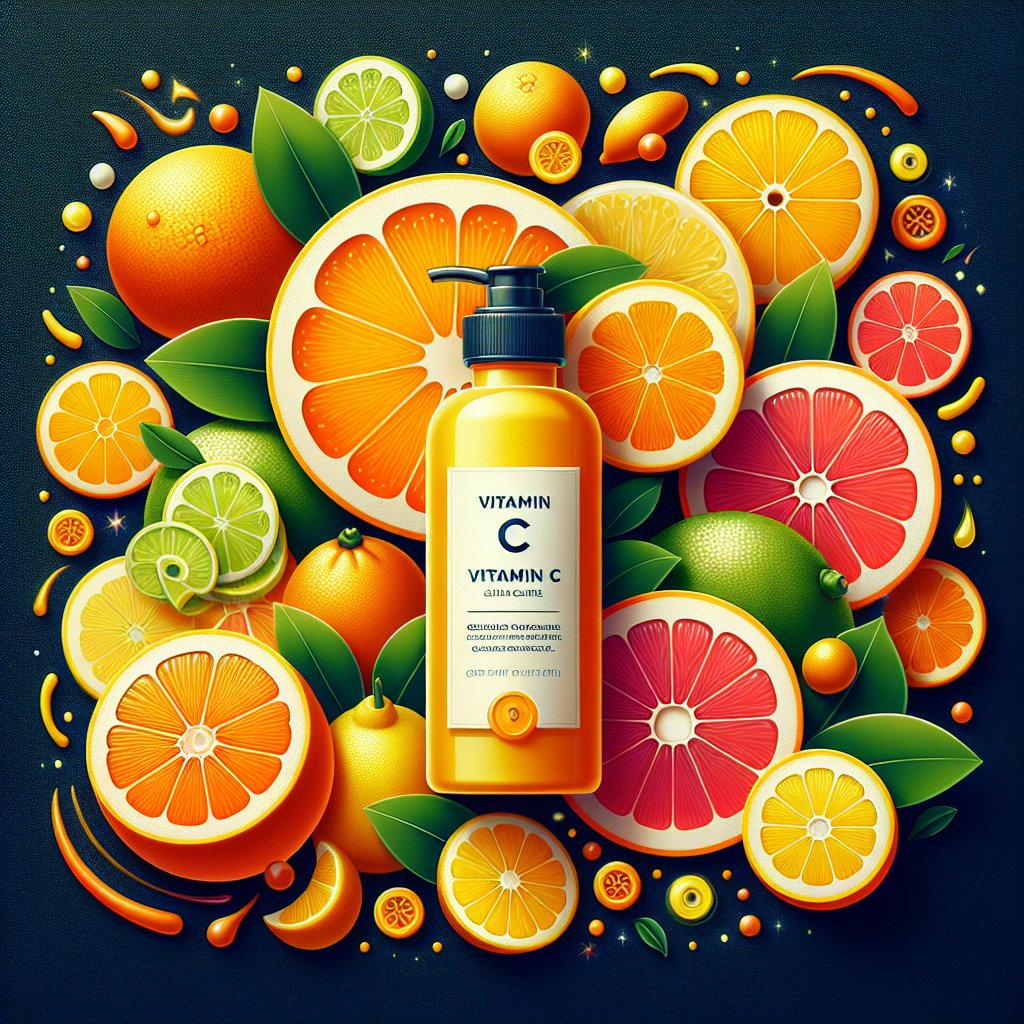Can I Use Niacinamide with Vitamin C? Unveiling the Perfect Skincare Duo for Radiant Skin!
Brief Overview of Niacinamide and Vitamin C Benefits for the Skin
Welcome, beauties! Today, we’re diving into the wonderful world of skincare to uncover the magnificent benefits of niacinamide and vitamin C. These two powerhouse ingredients have been making waves in the beauty industry, and for good reason! Niacinamide, also known as vitamin B3, and vitamin C are beloved for their ability to transform dull, tired skin into a radiant and youthful complexion.
Niacinamide is renowned for its impressive anti-inflammatory properties, making it ideal for soothing redness, and it helps to improve the skin’s natural barrier, leaving it more hydrated and resilient. On the other hand, vitamin C is celebrated for its exceptional antioxidant qualities, which assist in brightening the skin, minimizing the appearance of dark spots, and combating the effects of environmental stressors.
It’s no wonder that these two ingredients have gained widespread popularity in skincare routines around the world, as they have the potential to unveil a radiant, glowing complexion. Let’s explore how you can harness the benefits of niacinamide and vitamin C in your daily skincare routine!

What is Niacinamide?
Niacinamide, also known as nicotinamide, is a form of vitamin B3 that has been gaining popularity in the skincare world. It’s a powerhouse ingredient that offers a wide array of benefits for the skin. Whether you have oily, dry, or sensitive skin, niacinamide could be the game-changer in your skincare routine.
So, what does niacinamide do for the skin? Well, quite a lot. Let’s break it down.
Skincare Benefits of Niacinamide
Niacinamide has been extensively studied, and the research shows that it has numerous benefits for the skin. Firstly, it has remarkable anti-inflammatory properties, making it an excellent choice for those with acne-prone or sensitive skin. It helps to calm redness, reduce irritation, and soothe the skin.
Additionally, niacinamide is a potent antioxidant, which means it helps protect the skin from environmental damage and prevents premature aging. It can also assist in reducing the appearance of enlarged pores and improving uneven skin tone. In fact, clinical studies have shown that niacinamide can help to visibly improve the appearance of fine lines and wrinkles, hyperpigmentation, and overall skin texture.
Moreover, one of the most appealing aspects of niacinamide is its compatibility with other skincare ingredients, such as vitamin C. Its gentle nature makes it suitable for all skin types, including those with sensitive skin, making it a versatile addition to any skincare regimen.
But how does niacinamide work its magic on the skin? Let’s find out.
How Niacinamide Works on the Skin
Niacinamide works by supporting the skin’s natural barrier function, helping to lock in moisture and prevent transepidermal water loss. This can result in improved hydration and overall skin health. Furthermore, it plays a vital role in the synthesis of ceramides, a key component of the skin’s protective barrier, which is essential for maintaining a strong and resilient skin barrier.
Moreover, niacinamide has been shown to inhibit the transfer of pigment within the skin, which can help in reducing the appearance of dark spots and promoting a more even skin tone. Its ability to regulate oil production can also be beneficial for those with oily or acne-prone skin.
In essence, niacinamide is a multi-tasking ingredient with a proven track record of delivering significant benefits for the skin, making it an excellent choice for anyone looking to achieve a radiant and healthy complexion.
What is Vitamin C?
If you’ve been even remotely interested in skincare, you’ve probably heard about the wonders of vitamin C. But what exactly is this powerhouse ingredient? Well, let’s break it down. Vitamin C, also known as ascorbic acid, is a potent antioxidant that plays a crucial role in maintaining the health of our skin.
When it comes to skincare, vitamin C is revered for its numerous benefits, including brightening the complexion, reducing the appearance of dark spots and redness, and promoting collagen production. Additionally, it helps in protecting the skin from environmental stressors like pollution and UV radiation.
Skincare Benefits of Vitamin C
Vitamin C offers a myriad of skincare benefits that make it a must-have in your daily routine. One of its key qualities is its ability to brighten the skin, giving you a radiant and even-toned complexion. It also helps in reducing hyperpigmentation, making it an excellent choice for those dealing with sun damage or post-inflammatory hyperpigmentation.
Furthermore, vitamin C is celebrated for its anti-aging properties. By stimulating collagen production, it aids in maintaining skin firmness and elasticity, ultimately reducing the appearance of fine lines and wrinkles. In addition, its antioxidant properties help in neutralizing free radicals, preventing premature aging caused by environmental aggressors.
How Vitamin C Works on the Skin
So, how does vitamin C work its magic on the skin? Well, it primarily functions as an antioxidant, protecting the skin from oxidative stress. This means that it helps to neutralize free radicals, which are unstable molecules that can damage skin cells and lead to signs of aging.
Vitamin C also inhibits the production of melanin, the pigment responsible for skin discoloration and dark spots, thereby promoting a more even skin tone. Moreover, it supports the skin’s natural regeneration process, aiding in the repair of damaged skin cells and the promotion of a healthier complexion.
Benefits of Niacinamide and Vitamin C in Skincare
When it comes to achieving radiant and healthy skin, niacinamide and vitamin C are two powerhouse ingredients that work wonders individually. Let’s explore their individual benefits on the skin and how they can complement each other when used together.
Niacinamide:
Niacinamide, also known as vitamin B3, offers a myriad of benefits for the skin. It is renowned for its ability to enhance the skin’s natural barrier, helping to retain moisture and keep it hydrated. Research has shown that niacinamide has significant brightening effects, helping to even out skin tone and reduce the appearance of hyperpigmentation.
Moreover, niacinamide has been found to be effective in boosting collagen production, which contributes to firmer and more youthful-looking skin. Its anti-inflammatory properties also make it suitable for calming redness and soothing irritated skin, making it an ideal ingredient for those with sensitive skin.
Vitamin C:
Vitamin C, a potent antioxidant, is celebrated for its remarkable brightening and rejuvenating effects on the skin. It effectively inhibits melanin production, making it a powerful tool in reducing hyperpigmentation and dark spots. Additionally, vitamin C is crucial for the synthesis of collagen, playing a vital role in maintaining skin firmness and elasticity.
Notably, vitamin C also provides protection against environmental aggressors such as UV rays and pollution, making it an essential component in any skincare routine aimed at achieving healthy, glowing skin.
When used in conjunction, niacinamide and vitamin C can complement each other to deliver a comprehensive range of benefits, including brightening, evening out skin tone, reducing hyperpigmentation, and boosting collagen production.
Both ingredients are well-tolerated by most skin types, making them an ideal combination for those seeking to revitalize their skincare routine and achieve radiant, youthful skin.
Can Niacinamide and Vitamin C be Used Together?
There has been a lot of debate around whether niacinamide and vitamin C can be used together in skincare routines. Some have claimed that the combination of these two powerful ingredients can render them ineffective, while others swear by the benefits of using them simultaneously. Let’s delve into the scientific research to unveil the truth behind this skincare myth.
The Compatibility
Contrary to the common myth, niacinamide and vitamin C are actually compatible and can be used together without any adverse effects. Both ingredients offer remarkable benefits for the skin, and when used in combination, they can provide a synergistic effect, delivering a more comprehensive range of skincare benefits.
Research published in the Clinics in Dermatology journal indicates that niacinamide can help stabilize and boost the effectiveness of vitamin C in skincare products when used together. This debunking of the incompatibility myth has brought about a new wave of skincare formulations that incorporate both niacinamide and vitamin C for maximum efficacy.
Addressing Common Concerns
Some concerns have been raised about the potential for niacinamide and vitamin C to cause skin flushing or irritation when used together. However, extensive studies have shown that these concerns are largely unfounded. The Journal of Cosmetic Dermatology has reported that niacinamide possesses anti-inflammatory properties, which can actually help mitigate any potential irritation that may be associated with vitamin C.
In conclusion, the compatibility of niacinamide and vitamin C in skincare routines is backed by scientific evidence. With their combined potential to address a multitude of skin concerns, including hyperpigmentation, fine lines, and overall skin texture, incorporating both ingredients into your skincare routine can be a game-changer for achieving radiant and healthy-looking skin.
Can I Use Niacinamide with Vitamin C? Unveiling the Perfect Skincare Duo for Radiant Skin!
Research and Studies
While there have been concerns in the past about using niacinamide (a form of vitamin B3) with vitamin C in skincare, scientific research and studies have shown that these two powerful ingredients can, in fact, be used together effectively to enhance skin health and radiance.
According to a study published in the Journal of Cosmetic Dermatology, when niacinamide and vitamin C are used together, they have been found to provide a synergistic effect, improving the overall appearance of the skin. Both ingredients have antioxidative properties, and when combined, they work even more effectively in protecting the skin from environmental stressors and harmful UV rays. This means that using both niacinamide and vitamin C in your skincare routine can help in achieving a brighter and more youthful complexion.
Another study in the Journal of the American Academy of Dermatology found that the combination of niacinamide and vitamin C can help in reducing the appearance of fine lines and wrinkles. This is due to the stimulation of collagen production and the reduction of inflammation, leading to smoother and firmer skin.
Additionally, a study published in the Skin Pharmacology and Physiology journal demonstrated that niacinamide and vitamin C, when used together, can effectively reduce hyperpigmentation and improve skin texture. This is great news for those struggling with uneven skin tone or dark spots.
In conclusion, scientific research supports the idea that using niacinamide and vitamin C together can be highly effective in improving various aspects of skin health. When combined, these two powerhouse ingredients can provide a range of benefits, from protecting the skin against environmental damage to promoting a brighter, smoother, and more youthful complexion. With so much evidence backing their efficacy, it’s clear that niacinamide and vitamin C are indeed the perfect skincare duo for radiant skin.
How to Incorporate Niacinamide and Vitamin C in Your Skincare Routine
If you’re looking to achieve radiant skin, incorporating niacinamide and vitamin C into your skincare routine can make a significant difference. These two powerful ingredients work synergistically to brighten the skin, reduce hyperpigmentation, and improve overall skin texture. However, using them together requires some strategy for optimal results.
Introduce Them Gradually
When incorporating niacinamide and vitamin C into your skincare routine, it’s crucial to introduce them gradually. Start by using one product in the morning and the other in the evening to prevent any potential interactions between the two.
Choose the Right Formulations
Opt for stable formulations of both niacinamide and vitamin C to ensure their effectiveness. Look for niacinamide in the form of niacinamide cream or serum, and vitamin C in the form of L-ascorbic acid or ascorbyl phosphate for maximum stability and absorption.
Apply in the Correct Order
When using niacinamide and vitamin C together, it’s essential to apply them in the correct order to avoid any potential conflicts. In the morning, start with vitamin C to take advantage of its antioxidant properties, followed by niacinamide to reap its soothing and anti-inflammatory benefits.
By following these practical tips, you can seamlessly introduce niacinamide and vitamin C into your skincare routine and harness their combined skin-transforming powers.
Potential Side Effects and Precautions when Using Niacinamide with Vitamin C
When it comes to skincare, combining different active ingredients requires careful consideration. While using niacinamide and vitamin C together can be a powerful duo, there are potential side effects and precautions to be aware of.
Potential Side Effects
Research has shown that niacinamide and vitamin C are generally well-tolerated, but when used together, there is a possibility of experiencing mild irritation. This may include redness, stinging, or a warm sensation on the skin. However, it’s important to note that these side effects are uncommon and typically occur in individuals with very sensitive skin.
Precautions to Consider
To mitigate any potential side effects, consider doing a patch test before using niacinamide and vitamin C together on your face. Apply a small amount of the products on a discreet area of your skin and observe for any adverse reactions over 24 hours.
Additionally, it’s advisable to introduce one product at a time into your skincare routine when incorporating niacinamide and vitamin C. This approach allows your skin to acclimate to each ingredient, reducing the likelihood of irritation or sensitivity.
Finally, to ensure the compatibility of niacinamide and vitamin C, consult with a dermatologist or skincare professional, especially if you have existing skin conditions or are using prescription skincare products.
By being aware of these potential side effects and taking necessary precautions, you can safely harness the benefits of niacinamide and vitamin C for glowing, radiant skin.
Conclusion
In conclusion, the combination of niacinamide and vitamin C in skincare offers a multitude of benefits for achieving radiant and healthy skin. These powerhouse ingredients work synergistically to brighten, even out skin tone, and minimize the appearance of fine lines and wrinkles. The scientific evidence supporting their efficacy is substantial, making them a top choice for anyone looking to elevate their skincare routine.
However, it’s important to note that while these ingredients offer numerous advantages, consulting a dermatologist or skincare professional is crucial, especially for individuals with sensitive or reactive skin. Their personalized advice can help tailor a skincare regimen that maximizes the benefits of niacinamide and vitamin C while minimizing any potential interactions or side effects.
Remember, everyone’s skin is unique, and what works wonders for one person may not produce the same results for another. So, if you’re considering integrating niacinamide and vitamin C into your skincare routine, consulting a professional is the best way to ensure you’re making the most informed decisions for your skin’s health and vitality.


